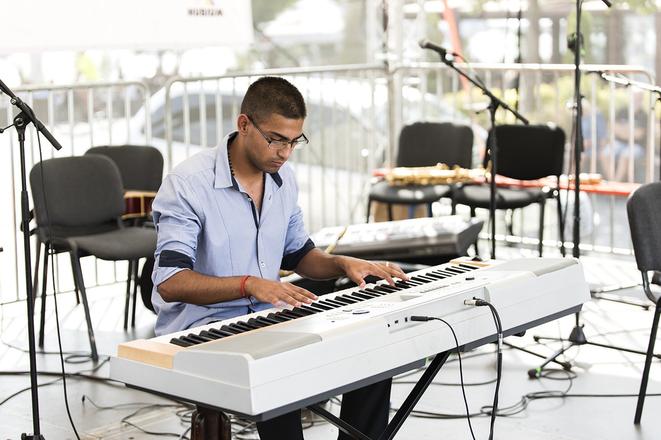“Wild poppies grow differently. They’re special, interesting, and fragile, but they easily attract other people’s attention. That’s what our children are like,” says Mária Potočárová Rybaričová, Senior Manager of Divé maky (Wild Poppies), an organization that supports children from socially disadvantaged families.
Stanko Harvan is one of them. He enjoys playing the piano and would like to make a living off of it. However, he comes from a poor family that cannot give him the support he needs to develop his talent. Stanko and his seven siblings live in a small cottage at the edge of the Roma settlement in Heľpa. Initially, Stanko learned how to play the piano on his own. After a while, he started attending an elementary art school, where the full extent of his talent became evident. “Since he didn’t have a piano at home, he came to art school every day to practice. However, we have managed to collect enough money from our donors to buy him a piano of his own,” explains Rybaričová. Stanko is currently attending the second grade of the conservatory.
“He is a talented student with an unusual determination to work on his skills and a great love of classical music,” says the principal of the Heľpa Elementary Art School. What makes Stanko’s story stand out is his decision to focus on a different musical genre than most Roma musicians. He is most interested in classical composers and their works. If you want to see his piano talent for yourself, you can come to the annual festival of Roma culture titled Cigánsky Bašavel, which will take place on 19 August at the Eurovea promenade in Bratislava.
Of course, Stanko is not the only Wild Poppy. The organization is currently working with approximately 40 Roma children with a variety of different talents. “We support children who are talented musicians, theater actors, dancers, athletes, and even students,” explains Rybaričová. They attend high schools and universities, but their families are unable to cover all costs associated with their studies.
In order to help them, the organization has established a scholarship program used to cover various expenses, such as dorm fees, transport costs, and school supplies. The program is also used to finance regular meetings aimed at developing the social skills of Roma children. One such event is titled Mladí rómski lídri (Young Roma Leaders). This program aims to show its attendees how they can help their friends and other Roma children. “It basically helps us see what kind of atmosphere prevails in schools, and we can find out whether Roma children have sufficient information about their study options,” adds Rybaričová. The members of Young Roma Leaders are trying to change the social climate. Not only do they want to motivate Roma children all over Slovakia to study, but they also communicate with local authorities and institutions that work with Roma communities.
The Wild Poppies want to continue working on projects like this to help improve the life of Roma people in Slovakia. Dobrá Krajina (Great Country) is giving you an opportunity to lend a helping hand, too. Children’s Day is one of the most joyous days of the year. These children will be happiest if they are able to continue doing what they enjoy and care about. You can provide financial help by clicking on the “I will donate” button.
The Slovak Spectator has teamed up with Dobrá Krajina (Great Country) to create a space for stories of people and communities who need our help. Each article in the For a Great Country series will give you the opportunity to support a specific project and actively contribute to building a great country.
Author: Viktor Hamšík, The Pontis Foundation

